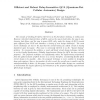86 search results - page 4 / 18 » Avoiding Shared Clocks in Networks of Timed Automata |
IPPS
2007
IEEE
14 years 1 months ago
2007
IEEE
In this paper, an almost peer-to-peer (AP2P) clock synchronization protocol is proposed. AP2P is almost peer-topeer in the sense that it provides the desirable features of a purel...
ECRTS
2007
IEEE
14 years 1 months ago
2007
IEEE
Since wireless ad-hoc networks use shared communication medium, accesses to the medium must be coordinated to avoid packet collisions. Transmission scheduling algorithms allocate ...
CEE
2008
13 years 7 months ago
2008
To adapt the data rate in accordance with the quality of the link, the IEEE 802.11 standard proposes the variable rate shifting functionality. This intrinsic functionality of the ...
DSN
2007
IEEE
14 years 1 months ago
2007
IEEE
Synchronous circuits are typically clocked considering worst case timing paths so that timing errors are avoided under all circumstances. In the case of a pipelined processor, thi...
DFT
2006
IEEE
13 years 11 months ago
2006
IEEE
The concept of clocking for QCA, referred to as the four-phase clocking, is widely used. However, inherited characteristics of QCA, such as the way to hold state, the way to synch...

